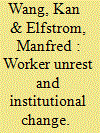| Srl | Item |
| 1 |
ID:
178760


|
|
|
|
|
| Summary/Abstract |
Drawing on an original dataset of Chinese protests, this article documents an evolving relationship between state coercive capacity and overt repression across administrations. Specifically, it finds that under Hu Jintao and Wen Jiabao (2003–2012) protests in provinces with higher coercive capacity were less likely to meet with a crackdown, whereas the relationship between capacity and repression reversed during the first three years of Xi Jinping’s rule (2013–2015). Although the study demonstrates that the two periods were on average very different, change-point analysis reveals that the inflection point toward a harder line came already in the late Hu-Wen era. The Xi administration’s policies should therefore perhaps be understood more as a manifestation than a cause of shifts in the country’s social control.
|
|
|
|
|
|
|
|
|
|
|
|
|
|
|
|
| 2 |
ID:
169789


|
|
|
|
|
| Summary/Abstract |
What impact is the current rise in workplace conflict having on governance in China? This article argues that, over time, protests are driving the state in two directions at once: towards greater repression and greater responsiveness. Using an original dataset of strikes, protests and riots by Chinese workers between 2003 and 2012, along with government budgetary and judicial statistics, the article demonstrates that significant, positive correlations exist at the provincial level between increased unrest on the one hand and both increased spending on the People's Armed Police (repression) and increasing numbers of pro-worker and split decisions in mediation, arbitration and court cases (responsiveness) on the other. Feedback effects exist with regard to responsiveness, though: more cases in which workers win something in turn seem to spur greater unrest. The article closes by noting the changes since Xi Jinping took office and examining the implications of the findings for China's political development.
|
|
|
|
|
|
|
|
|
|
|
|
|
|
|
|
| 3 |
ID:
151968


|
|
|
|
|
| Summary/Abstract |
Worker protests in China are increasing in frequency, and workers are making more ambitious demands. However, it is unclear whether this activism is, on the whole, drawing a reformist or conservative response from officials. Using a 2014 survey of city-level leaders from China’s official trade union federation, we find that an acknowledgement of the seriousness of today’s labour disputes and of how the country’s industrial relations are changing is positively correlated with respondents’ optimism regarding the likelihood of changes to China’s political system. To determine exactly what this means ideologically, we further compare reform optimists and pessimists with regard to their support for a range of more specific policies, finding that those who believe systemic changes are close at hand have different views from their peers regarding the importance of engagement with global civil society and a tripartite (government, union, employer) approach to managing workplaces. This provides tentative support for the idea that reform optimists are reform supporters and that interest in change among Chinese officials, at least at the level studied here, is growing alongside workplace conflict.
|
|
|
|
|
|
|
|
|
|
|
|
|
|
|
|